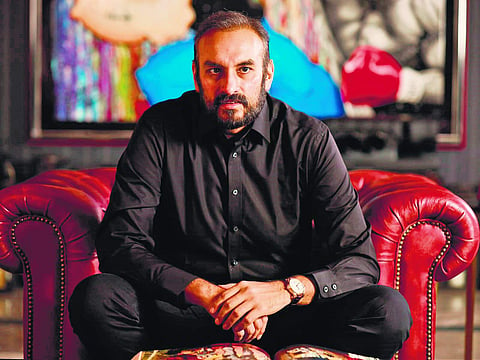
- LIFESTYLE
- FASHION
- FOOD
- ENTERTAINMENT
- EVENTS
- CULTURE
- VIDEOS
- WEB STORIES
- GALLERIES
- GADGETS
- CAR & BIKE
- SOCIETY
- TRAVEL
- NORTH EAST
- INDULGE CONNECT

This year, the Academy Awards may have attracted attention for all the wrong reasons (Will Smith’s reaction to Chris Rock’s joke) but there was more to the evening. Even as the internet scrambled to bring back the attention to the first deaf man who won an acting Oscar, the first openly queer woman of colour to bag an Oscar and the third woman to win the best director award — we have our own reasons for celebration. India-born VFX genius Namit Malhotra’s company DNEG clinched its seventh visual effects award for Denis Villeneuve’s directorial Dune beating two Marvel movies, Shang-Chi and the Legend of the Ten Rings and Spider-Man: No Way Home! However, Namit is unfazed by the victory and says that the film goes beyond the award as it has set the benchmark in the world of visual effects, with a brilliant creative team conjuring up the magic that we see on screen. Besides Dune, DNEG was also nominated for stellar visual effects in the James Bond movie — No Time To Die — at the 94th Academy Awards. We caught up with Namit to talk more on the win, what goes behind creating visual effects and if VFX is a threat to realistic cinema. Excerpts:
Congratulations on the award! Did you expect this while working on the film?
When we make a film, we want to make that the best thing. We take pride in taking James Bond to the Oscars for the first time since its inception in 1962. We take a lot of credit for it since we are at the forefront of it. For Dune, we had a director like Denis Villeneuve who is a master. His aesthetic vision and quality have won Oscars in the past, so, we do believe that he has got an eye. There was always a hope that we are going to turn something in our favour with his vision and our ability to create that, leading to a great outcome. The visual effects of Dune have set a benchmark for what high-quality storytelling is all about. I never thought that’s where we would land.
What goes on in the minds of the team when they are creating these visuals?
It’s an interesting question! See, we are a very interesting fusion of creative artistry and technical skills that are needed to execute the best work. We are applying a lot of physics and science to figure out how to make something look so imaginative and fresh, yet so real. That’s the core of what’s happening behind the camera and it’s an interesting world where artists and technicians live together.
Does this process make realistic cinema take a back seat?
This is more of a generational thing. There has always been someone else doing the challenging things. For instance, actors were never jumping into the fire or from a building. It was a camera trick or someone else doing it for the actors and now it’s called VFX. The idea of using tricks to make the audience believe that a particular thing happened is ultimately about entertaining people. It’s not about what’s real but about believing what looks real.
Do tell us about Brahmastra. How different is it from Dune?
Visual effect as a technical aspect is pretty consistent. It’s the subject matter that’s always different. Iron Man, Batman is different from a character that is grounded in mythology, it will be presented through different lenses. Ayan Mukerji has visualised the film very beautifully in terms of how he has envisioned the story from our mythology and put it in a way that’s not anything like Hollywood.
How do you see the growth of the VFX industry over the years?
It is rapid and the progression is huge. Telling stories through VFX is only going to grow on a bigger scale. When we want to tell bigger stories of time travel, sci-fi, robots and superhumans, we want to tell the story differently and VFX is a strong tool to deliver that. It’s like you need a camera to make a movie and VFX to make that look different. VFX is going to be the second nature of filmmaking.
Will that reduce the actor’s job?
I think you can make actors more productive. You can make the future of cinema certainly count. We can bring actors to life and have them be stuck into that life or we can make them immortal. An actor can live even after he is not present in the world. That’s going to happen. It’s like we want them to work longer or work even once they retire or stop living physically in the world.
priyanka.chandani@newindianexpress.com